Related Research Articles

Mickey Mouse Works is an American animated television series produced by Walt Disney Television Animation featuring Mickey Mouse and his friends in a series of animated shorts. The first Disney television animated series to be produced in widescreen high definition, it is formatted as a variety show, with skits starring Mickey Mouse, Minnie Mouse, Donald Duck, Daisy Duck, Goofy, Pluto and Ludwig Von Drake while Horace Horsecollar, Clarabelle Cow, Morty and Ferdie Fieldmouse, Huey, Dewey and Louie, Chip 'n' Dale, Scrooge McDuck, Pete, Humphrey the Bear, J. Audubon Woodlore, Dinah the Dachshund, Butch the Bulldog, Mortimer Mouse, José Carioca, and Clara Cluck appear as supporting or minor characters. Musical themes for each character were composed by Stephen James Taylor with a live 12-piece band and extensive use of the fretless guitar to which the music of the series was nominated for an Annie Award in both 1999 and 2001. Most of the shorts from the series were later used in House of Mouse.

Trick or Treat is a 1952 animated short film produced by Walt Disney Productions and released by RKO Radio Pictures. The cartoon, which takes place on Halloween night, follows a series of pranks between Donald Duck and his nephews with Witch Hazel. The film was directed by Jack Hannah and features the voices of Clarence Nash as Donald and his nephews, and June Foray as Hazel.
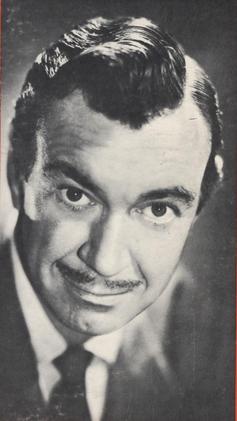
Thurl Arthur Ravenscroft was an American actor and bass singer. He was well known as one of the booming voices behind Kellogg's Frosted Flakes animated spokesman Tony the Tiger for more than five decades. He was also the uncredited vocalist for the song "You're a Mean One, Mr. Grinch" from the classic Christmas television special, Dr. Seuss' How the Grinch Stole Christmas!
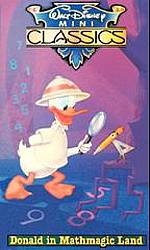
Donald in Mathmagic Land is an American live-action animated featurette produced by Walt Disney Productions and featuring Donald Duck. The short was directed by Hamilton Luske and was released on June 26, 1959. It was nominated for an Academy Award for Best Documentary at the 32nd Academy Awards, and became a widely viewed educational film in American schools of the 1960s and beyond.
Scrooge McDuck and Money is an American animated short film produced by Walt Disney Productions, directed by Hamilton Luske, and featuring the characters Scrooge McDuck and Huey, Dewey, and Louie. The short was released on March 23, 1967.
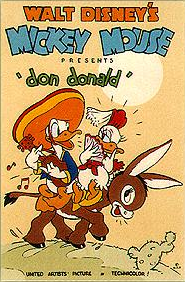
Don Donald is a 1937 American animated short film produced by Walt Disney Productions and released by United Artists. The cartoon follows Donald Duck attempting to woo a female Mexican duck named Donna. It was directed by Ben Sharpsteen and features music by Paul J. Smith which was adapted from the Mexican folk songs "Cielito Lindo" and "Jarabe Tapatío". Clarence Nash voiced both Donald and Donna.

Modern Inventions is a 1937 American comic science fiction animated short film produced by Walt Disney Productions and released by United Artists. The cartoon follows Donald Duck as he tours the fictional Museum of Modern Marvels. It was directed by Jack King, his Directional debut at Disney, and features original music by Oliver Wallace. The voice cast includes Clarence Nash as Donald, Billy Bletcher as the Robot Butler, Elvia Allman as the Robot Baby Carriage and Don Brodie as the Robot Barber.

The Nifty Nineties is an animated short film produced in Technicolor by Walt Disney Productions and released to theaters on June 20, 1941, by RKO Radio Pictures. The animated short was directed by Riley Thomson and animated by Ward Kimball, Walt Kelly, Fred Moore, Claude Smith, David Swift, and Les Clark with effects animation by Art Fitzpatrick. It was the 113th short in the Mickey Mouse film series to be released, and the fourth in that year. The film stars Mickey and Minnie Mouse and romanticizes the decade of the 1890s.

John James MacDonald was a Scottish-American foley artist, voice actor, musician and conductor. He was the original head of the Disney sound effects department, and was also the 2nd official voice of Mickey Mouse from 1947 to 1976 and again in 1978 and 1987 after Walt Disney stopped playing the character and before Wayne Allwine became the third voice of Mickey in 1977.
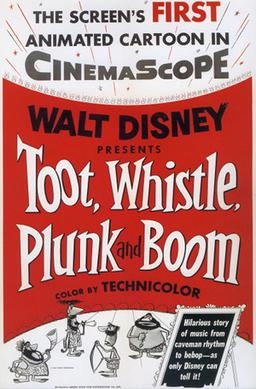
Toot, Whistle, Plunk and Boom is an American animated short film produced by Walt Disney Productions and directed by Ward Kimball and Charles A. Nichols. A sequel to the first Adventures in Music cartoon, the 3-D short Melody, Toot, Whistle, Plunk and Boom is a stylized presentation of the evolution of the four orchestra sections over the ages with: the brass ("toot"), the woodwind ("whistle"), the strings ("plunk"), and the percussion ("boom").
The Mellomen were a popular singing quartet active from the late 1940s through the mid-1970s. The group was founded by Thurl Ravenscroft and Max Smith in 1948. They recorded under a variety of names, including Big John and the Buzzards, the Crackerjacks, the Lee Brothers, and the Ravenscroft Quartet. They were sometimes credited as the Mellowmen, the Mello Men, or the Mellow Men. They sang backup to some of the best-known artists of the day, including Rosemary Clooney, Bing Crosby, Doris Day, Arlo Guthrie, Frankie Laine, Peggy Lee, Elvis Presley, and Jo Stafford.

William Lee was an American playback singer who provided a voice or singing voice in many films, for actors in musicals and for many Disney characters.
Hamilton Somers Luske was an American animator and film director.
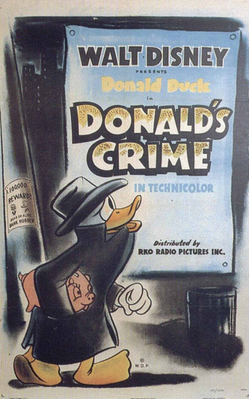
Donald's Crime is a 1945 American animated short film produced by Walt Disney Productions and released by RKO Radio Pictures. The cartoon, which parodies film noir crime dramas of the time, follows Donald Duck as he struggles with guilt after stealing $1.25 from his nephews. The film was directed by Jack King and features original music by Edward H. Plumb. The voice cast includes Clarence Nash as Donald, Huey, Dewey, and Louie, Ruth Clifford as Daisy Duck, and Harry E. Lang as the off-stage voice of Donald's conscience. This was Blondell's first performance as Daisy and marks the debut of the character's "normal" voice. Previously in Mr. Duck Steps Out, Daisy had been voiced by Nash using a voice similar to Donald's.

Rugged Bear is a 1953 American animated short film produced by Walt Disney Productions and released by RKO Radio Pictures. The cartoon follows Humphrey the Bear as he takes refuge in Donald Duck's cabin during hunting season by disguising himself as a bearskin rug. The film was directed by Jack Hannah and features the voices of Clarence Nash as Donald, Jimmy MacDonald as Humphrey, and an uncredited narrator.

No Hunting is a 1955 American animated short film produced by Walt Disney Productions and released by RKO Radio Pictures. The cartoon features Donald Duck participating in an overly-dramatic hunting trip after being inspired by his pioneer ancestor. The film was directed by Jack Hannah and features original music by Oliver Wallace. It was produced in widescreen CinemaScope.

Paul Bunyan is a 1958 American animated musical short film produced by Walt Disney Productions. The short was based on the North American folk hero and lumberjack Paul Bunyan and was inspired after meeting with Les Kangas of Paul Bunyan Productions, who gave Disney the idea for the film. The film was directed by Les Clark, a member of Disney's Nine Old Men of core animators. Thurl Ravenscroft starred as the voice of Paul Bunyan. Supporting animators on the project included Lee Hartman.
The Litterbug is an American animated short film produced by Walt Disney Productions and featuring Donald Duck. It was released on June 21, 1961, and was the last theatrical Donald Duck short to be produced.
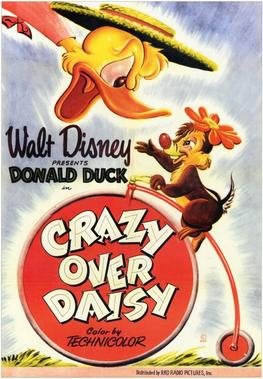
Crazy Over Daisy is a Donald Duck animated short film which was originally released on March 18, 1950. Produced by Technicolor by Walt Disney Productions and RKO Radio Pictures, the short featured Donald Duck, Daisy Duck, and Chip n' Dale. Mickey Mouse, Minnie Mouse, and Goofy also made a brief cameo at the beginning of the film. The story takes place in the 1890s. Donald is on his way to visit Daisy, when Chip n' Dale come along and spoil the date.

Donald's Dream Voice is a 1948 American animated short film featuring Donald Duck, the film was directed by Jack Hannah and produced by Walt Disney. In the short film, no one understands a word that salesman Donald says, so he takes voice pills to improve his speech.
References
- ↑ Lenburg, Jeff (1999). The Encyclopedia of Animated Cartoons. Checkmark Books. pp. 74–76. ISBN 0-8160-3831-7 . Retrieved 6 June 2020.
- ↑ Walt Disney's "Donald and The Wheel" (1961)
- ↑ The Pittsburgh Press from Pittsburgh, Pennsylvania on June 18, 1961
- ↑ "The Chronological Donald Volume 4 DVD Review". DVD Dizzy. Retrieved 13 February 2021.